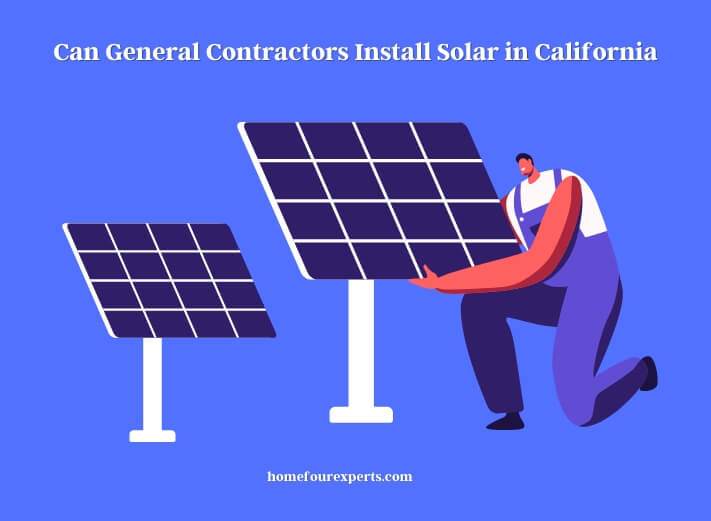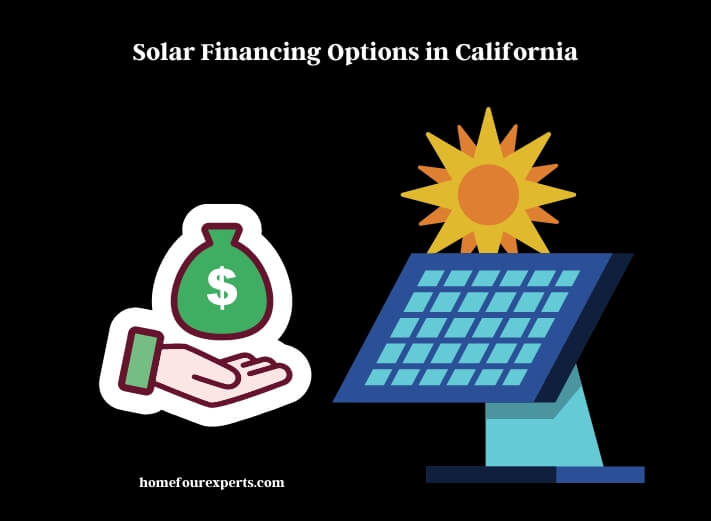California is at the forefront of renewable energy, and solar power plays a significant role in this green revolution. With abundant sunshine and a progressive energy policy, solar power installations in the Golden State are increasingly popular among homeowners and businesses alike.

As solar installations become more prevalent, general contractors are frequently asked about their ability to install solar panels. This article explores the regulations, licensing, and qualifications needed for general contractors to install solar in California.
California Solar Regulations
California solar installation permits
Solar installations in California require permits from local building departments. These permits ensure that solar systems comply with building and safety codes, as well as local ordinances and regulations.
The California Solar Rights Act
The California Solar Rights Act, enacted in 1978, protects the right of homeowners to install solar energy systems. The act limits the ability of homeowners’ associations (HOAs) and local governments to impose restrictions on solar installations.
The California Solar Permitting Guidebook
The California Solar Permitting Guidebook, published by the Governor’s Office of Planning and Research, provides guidance for local governments, contractors, and homeowners on the solar permitting process.
General Contractor Licensing in California
The California Contractors State License Board (CSLB)
The CSLB regulates contractor licenses in California, including those for general contractors. A General Building (B) contractor can perform a variety of construction tasks, including installing solar panels, as long as they hold the appropriate license.
The General Building (B) contractor classification
General Building (B) contractors in California can install solar systems if they meet certain requirements. For example, they must subcontract the installation of solar panels to a Solar (C-46) contractor or hold a C-46 license themselves.
Licensing requirements for solar installations
To obtain a C-46 license, a general contractor must demonstrate experience in solar installations and pass a licensing exam. This ensures that they are knowledgeable about solar technology, safety requirements, and industry best practices.
Solar Installation Specializations
The Solar (C-46) contractor classification
The Solar (C-46) contractor classification is a specific license for contractors who specialize in solar installations. C-46 contractors are experts in solar system design, installation, and maintenance.
Differences between General (B) and Solar (C-46) contractors
While both General (B) and Solar (C-46) contractors can install solar systems, C-46 contractors have specialized training and experience in solar technology. General contractors who hold a C-46 license can provide the same expertise as dedicated solar installers.
Training and certification programs for solar installers
Several organizations, such as the North American Board of Certified Energy Practitioners (NABCEP), offer training and certification programs for solar installers. These programs help ensure that contractors have the knowledge and skills needed to perform high-quality solar installations.
Pros and Cons of General Contractors Installing Solar
Benefits of hiring a general contractor
General contractors who hold a C-46 license can offer several benefits, including a single point of contact for all construction tasks, potentially lower costs, and broader expertise in construction and energy efficiency.
Potential drawbacks and limitations
The main drawback of hiring a general contractor to install solar panels is that they may lack the specialized experience and expertise of a dedicated Solar (C-46) contractor. This could lead to longer installation times or issues with system performance.
Solar Financing Options in California
The California Solar Initiative (CSI)
The California Solar Initiative (CSI) is a state-funded program that provides incentives for solar installations. Homeowners and businesses can take advantage of these incentives to offset the cost of solar panel installations.
Federal tax credits and incentives
The federal government also offers tax credits for solar installations, such as the Investment Tax Credit (ITC), which can offset a significant portion of the installation costs.

Property Assessed Clean Energy (PACE) programs
PACE programs allow homeowners to finance solar installations through an assessment on their property taxes. This financing option helps to make solar installations more affordable for many California residents.
Selecting a Solar Installation Company
Tips for choosing the right solar installer
When selecting a solar installation company, it’s essential to consider factors such as the contractor’s licensing, experience, and reputation. Requesting references, checking online reviews, and comparing quotes from multiple contractors can help ensure that you choose the right installer for your project.
Comparing quotes from different contractors
Comparing quotes from different contractors can help you find the best price and service for your solar installation. Be sure to consider factors such as the quality of the solar panels, warranties, and the installer’s experience when comparing quotes.
Evaluating customer reviews and testimonials
Customer reviews and testimonials can provide valuable insights into a contractor’s professionalism, work quality, and customer service. Reading these reviews can help you make an informed decision when choosing a solar installation company.
The Solar Installation Process
Site assessment and system design
A solar installer will conduct a site assessment to determine the optimal system size, placement, and design for your property. This assessment includes evaluating your property’s solar potential, energy consumption, and any site-specific challenges.
Obtaining permits and approvals
Your solar installer will work with local authorities to obtain the necessary permits and approvals for your solar installation. This process may include submitting plans, coordinating inspections, and meeting any local requirements.
Installation and final inspections
Once permits are obtained, the solar installer will begin the installation process. This includes mounting the solar panels, connecting the system to your electrical grid, and ensuring that everything is working correctly. After the installation, a final inspection will be conducted to ensure compliance with local codes and regulations.
Solar System Maintenance and Monitoring
The importance of regular system maintenance
Regular maintenance is crucial to ensure the optimal performance and longevity of your solar system. This includes cleaning the panels, checking the inverter, and monitoring the system’s performance.
Monitoring solar system performance
Monitoring your solar system’s performance can help you identify any issues and optimize energy production. Many solar systems come with monitoring software or apps, allowing you to track your energy production and consumption.
Troubleshooting common solar system issues
If you encounter any issues with your solar system, consult your installer or the system’s manufacturer for guidance. They can help diagnose the problem and provide solutions to ensure your solar system continues to operate efficiently.
Summary
In California, general contractors can install solar panels if they hold a C-46 license or subcontract the installation to a Solar (C-46) contractor. This provides homeowners with more options when choosing an installer for their solar system. When selecting a solar installation company, it’s essential to consider factors such as licensing, experience, and reputation to ensure a high-quality solar installation.
Frequently Asked Questions (FAQs)
Can a general contractor install solar panels on my home or business in California?
Yes, a general contractor can install solar panels in California if they hold a C-46 license or subcontract the installation to a Solar (C-46) contractor.
What should I look for in a solar installation company?
When choosing a solar installation company, consider factors such as licensing, experience, reputation, quality of solar panels, warranties, and customer reviews.
How do I know if my general contractor is qualified to install solar panels?
A qualified general contractor should hold a C-46 license or subcontract the installation to a Solar (C-46) contractor. You can verify a contractor’s license through the California Contractors State License Board (CSLB) website.
What is the difference between a General (B) contractor and a Solar (C-46) contractor?
A General (B) contractor can perform various construction tasks, while a Solar (C-46) contractor specializes in solar installations. A general contractor can install solar panels if they hold a C-46 license or subcontract the installation to a Solar (C-46) contractor.
Can I install solar panels myself in California?
While it is possible to install solar panels yourself, it’s generally not recommended due to the complexity of the installation process and the need to comply with local building codes and regulations. Hiring a licensed contractor ensures a safe and reliable solar installation.
Relevant Resources:
- Best Solar Powered Motion Security Ligh
- Solar Fence Chargers
- Boat Solar Battery Chargers
- Solar Chargers for Trolling Motor Battery
- Marine Solar Panels
About This Writer

Hi, I am Eric Devin and I am a professional interior architect. Since childhood, I've always enjoyed DIY projects! And, I have loved to solve simple household problems using essential tools and equipment. I have also acquired a lot of information about basic household tools settings by working with contractors.